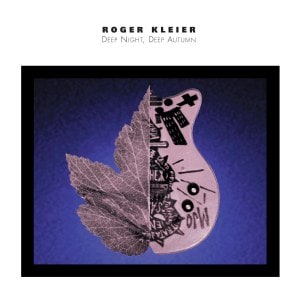with alternate tunings, Middle Eastern licks,
and some old-fashioned noise.”
Experimental guitarist Roger Kleier is an important part of New York’s downtown new music scene. He regularly performs and records with a variety of established, leading-edge musicians, including Kato Hideki, Ikue Mori, David Moss, Phill Niblock, Marc Ribot, Elliott Sharp, LaDonna Smith, Carl Stone, Davey Williams, and others.
Kleier seduces listeners by mutating his guitar in various ways, ranging from the hallowed techniques of Jimi Hendrix and Captain Beefheart, through the extended techniques of avant-garde guitar-mangling, to the recent technological innovations of sampling, layering, and digital sound processing. His unique style draws equally from improvisation, contemporary classical music, and the American guitar traditions of blues, jazz, and rock.
Elliott Sharp writes that this CD is “a bittersweet record,” where “drones melt into lyrical melody,” where “the sweetsour wistfulness of detuned chords, existing completely outside of any European tonal sensibility, morphs into geological mass,” and where “gradual processes and the sensuality of the rich timbres” draw the listener “deeper and deeper” into “full immersion.”
The CD’s music emerges from strong emotional associations of the composer. The Juan Cortina Suite was inspired by the legendary nineteenth-century outlaw and military leader Juan Cortina, who holds a special place in Mexican-American popular culture as a symbol of resistance to the long-running history of anti-Hispanic racism in the U.S. In July 1859, in Brownsville, Texas, Cortina witnessed an Anglo marshal pistol-whipping a local Mexican. Cortina demanded that the officer stop, but he refused. Cortina then shot and wounded the Marshal, and fled with the abused man on his horse. Later that year, after the U.S. had annexed the Texas territories, the environment for local Mexican-Americans had grown very hostile. Lynchings were common. In September, Cortina led a raid on Brownsville and freed Hispanics that had been wrongly imprisoned there. Texas called in the United States army, and Cortina was forced to retreat into Mexico, where he died in 1892. Kleier comments that “Cortina’s story has a natural attraction for me, as I am Mexican-American and I experienced bigotry first-hand when I lived in Texas during the 1970s.”
We Speak of Deep Night is a three part through-composed work that explores the contradictions involved with forging together static ideas with relentless tension, using the ebb and flow of timbres and densities.
Brickyard is an interlude constructed from distorted guitar samples. The piece’s pungent tones were inspired by the paintings of Philipino artist Manuel Ocampo, noted for his juxtapositions of controversial images and styles. Lodi, a solo concert piece, is named for a town in the dry and sunbaked San Joaquin Valley in Northern California.
Chambers Street was written in memory of cellist Tom Cora, who lived on Chambers Street in Manhattan for many years and passed away in 1998. Kleier recalls, “I always enjoyed his elastic melodies and Arabic-sounding passages.”
Inspired by a meteor shower witnessed while at the Djerassi Resident Artists Program in California, Woodside Meteor was immortalized by San Francisco sculptor Walter Robinson, who carved a large meteor out of wood inspired by the event.
We Speak of Deep Autumn is a process composition that uses layered loops of electric guitar. The loops were altered in several different ways with a multi-effects unit, then overdubbed many times. It was inspired by dusk and how one’s eyes adjust slowly with the descending darkness, as colors slowly shift until only silhouettes remain.
The title of this brooding, elegiac CD was inspired by a quote from the Soviet poet and war correspondent Ilya Ehrenburg: “We speak of deep night, and we speak of deep autumn – when we speak of Stalingrad, we will speak of deep war.”
An earlier Kleier CD, Klangenbang, was called “Impressive stuff!” by The Wire, and Option declared that “adventurous guitar fans and anyone with ears wide open should seek this out.”







